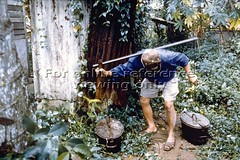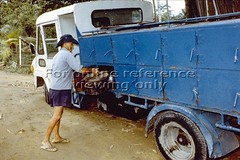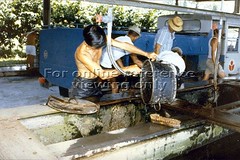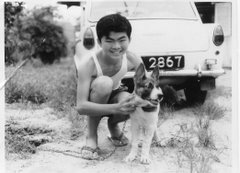Needless to say, this gentleman was not a Singaporean. Nowadays, no Singaporean would take on such a dirty and lowly job. Whilst so much resentment has been generated in the blogosphere about the foreign talents in our midst, I am sure many Singaporeans appreciate foreign workers like this rubbish collector who perform an essential service for our society.
This reminds of yet another lowly profession from my kampong days which has since become extinct in Singapore. Many years ago, I read of a survey about the ‘respectability’ of different professions. Right there at the bottom of the list was a profession known as The Night Soil Carrier. I wonder how many young Singaporeans even know what that is, let alone have seen one of them in action. So while others blog about Singaporeans’ favourite subject – food, I will play the ‘contrarian’ role and write about something at the other end of the food train instead.

The night soil carrier is a man who collects human waste. Back in the days when many of us stayed in kampongs, the so-called Bucket System was the most modern and hygienic method of waste disposal available. In those days, the family toilet was usually built several metres to the rear of our homes, away from the public view, as well as to keep away the smell. Thus if you needed to answer nature’s call when it rained, you would need an umbrella. Each day, we would deposit our ‘stuff’ into a metal bucket and the next morning, the night soil truck would come around to pick up the buckets. The night soil carrier would bring along an empty bucket to replace the full one. He would then attach a metal cover to the old one and carry it, 2 at a time to the truck. The truck looked a bit like the armoured vans used by our banks today. It had several rows of ‘deposit boxes’ for the buckets. These were brought back to the sewerage centre where they were emptied of their contents and the buckets cleaned. And all this was done manually!

The above 3 photos are Property of National Archives of Singapore
According to the PUB website, the bucket system was phased out in 1987. But actually, the bucket system was not the most primitive  system. Even in my days, it was not uncommon to see what PUB calls ‘overhanging toilets’ built over fish ponds. (Photo on right taken by my friend Peh S K in Pulau Ubin). In fact if you go to Malaysia, you can still see these in some rural areas. I am sure many Singaporeans who have visited the fishing village of Kukup in Southern Johor and stayed at the holiday chalets there have experienced what it was like to ‘do your business’ directly into the sea.
system. Even in my days, it was not uncommon to see what PUB calls ‘overhanging toilets’ built over fish ponds. (Photo on right taken by my friend Peh S K in Pulau Ubin). In fact if you go to Malaysia, you can still see these in some rural areas. I am sure many Singaporeans who have visited the fishing village of Kukup in Southern Johor and stayed at the holiday chalets there have experienced what it was like to ‘do your business’ directly into the sea.
And that reminds me of yet another interesting system which only our NS (national service) boys would have experienced – the Taiwanese army camp system. For those army boys like my friend Victor who missed out on this unique experience, I shall describe it below. Unfortunately I do not have any photos to illustrate.
Basically the toilets were made up of 2 rows of cubicles built over 2 long narrow drains over which you have to squat. The partitions were only about chest high, and so sometimes, when you and you neighbour happened to finish your missions at the same time, you would get bit of a shock to see another person face to face when you stood up. There were no individual flushes. Occasionally, somebody would turn on the tap and the water would flow from one end of the drain to the other. If you happen to be occupying the last cubicle, you would be treated to quite an unforgettable sight. I hope this is sufficient to motivate some of our reluctant young men to look forward to their NS.
It’s been about one year since I started this blog. Occasionally I find young people commenting that they wished they could be living in my kampong days. Frankly, I doubt they would want to do that if they fully appreciated the conditions that I have deliberately described in a nostalgic and light-hearted way.





24 comments:
i like this entry, because i remember how my mum used to tell me about how they actually dispose these "waste" heh...
then again, there could be something you (as a man) might not know, but it is kind of weird to post it here.. haha.. its about what woman used to wear in that period of every month. :p
Woa.. this post is pretty "graphic", if I may say so. You're much older than I thought, Chun See. Sure you're a dragon? :P
As for the Taiwan method, I remember we simply dug a hole in the jungle with the changko and just covered it up after having done our business leh. No fuss at all. Hee.
Etel - You are right. I don't know about that one.
Chris - There are actually some even more graphic photos at the National Archives website.
About humble jobs, I have this very recent personal story to share with you and your readers. Two hours ago, after having dinner at Parkway Parade's food court at B1, I visited the gents. While in the gents, I heard some melodious singing in a language which I could not understand. I turned around and saw a lad who looked no more 20-year old who was carrying a bucket and a mop. It was then that I realised he was either a cleaner or a janitor. I struck up a conversation with him by complimenting his singing talent. While he was still feeling proud, I took the opportunity to ask him what language he was singing in. He said it was Kadazan and he was from Sabah, Malaysia. So he was another foreign talent in Singapore, performing a very humble job which few locals would take up. And doing it very happily, it seemed.
About the overhanging toilets - many years ago, I visited Raffles Lighthouse. (If I am not wrong, I think it is located on an island called Pulau Satumu, some 10 km away from mainland Singapore.) The toilet there was of the overhanging type. If you look down through the hole, you can see fishes swimming in the sea, waiting for those crucial moments. I think that toilet should still be around since I don't think our country's modern sewerage system has been extended that far. I believe that the lighthouse is out-of-bounds to the public. Otherwise, you should really go take a nostalgic look and perhaps take some photos for your blog.
Always so charming and never missed an opportunity to make new friends. I was in Sabah once but never knew their language is known as Kadazan. Is it really melodious? Or are u referring to the singing? :P
>Always so charming and never missed an opportunity to make new friends.
Is that so, Chris? But Chun See has been saying that my fear makes strangers out of people who would otherwise be my friends. LOL.
That lad could really sing quite well - it was his singing that was melodious. I actually wanted to secretly take a video of him doing his number (for me to post on my blog). But then, I remembered Chun See's golden advice just in time.
now i wonder how many countries still have this job?
singing? did i hear singing? shall we go ktv??? :D
Oh yes, that reminds me. Besides Evan playing a few tunes on Chun See's piano during the coming X'mas celebration (which Elaine suggested first), Elaine should sing a few songs too. For those who don't already know, she's quite an accomplished singer. She once sent me an mp3 song of her singing 温柔的夜. Boy, was I mesmerized.
Chun See, why are you keeping so quiet about Elaine's suggestion?
I still cannot understand how a post about night soil can turn into discussion about food. Maybe the photos cause Victor's thots to switch to popiah. Anyway, I will respond on Victor's blog.
I have used these 'overhanging toilets' before...over a pond. You could see fish when there was water but during low tide you would instead see hordes of flies buzzing around the faeces....not a nice place to do your business.
These foreign talents who do jobs that we don't want to do be it construction workers or waitresses know that they have to do the job well to continue working and staying here.
A lady relative of mine complained that children (grown up ones) nowadays refused to to take up difficult like construction & shipyard jobs when available. She further commented that the present youngsters are pampered and choosy. I replied: "
Do you mean that you would persuade your kids to consider taking up these difficult jobs later on ? She remained silent on hearing my remark.
This is something we all take for granted and beyond the comprehension of all the young kids these days. That's why a camping trip in the wilderness is so educational!
Young kids aside, even some of our NSmen are a pampered lot. IPPT in airconed gym.
Since ancient time no parents want their children to take up menial jobs. They want them to be 'dragons' and 'phoenixes'. But that doesn't mean we can't do it.
In my kampung days in the 70's our toilet a big hole dug in the ground and then covered with zinc sheets. The waste are then deposited there.
I was quite surprised to hear from my girl that back in her home Osaka, they didnt have proper sewage piping system till the late 70's. A huge truck owuld come and suck the sewage from these tanks located next to the house. I was rather surprised, hearing that about an advanced nation like Japan.
Talking about aircon, here is a story. I once saw a young girl alighting at a bus-stop opposite the AMK MRT, and immediately took another aircon bus directly heading to AMK bus interchange, about 2 bus-stop away. The reason was most obvious she did not like walking to the town centre under the hot sun and preferred to pay, keeping cool at the same time.
I well remember this sight when I lived in Singapore in the 60's.The house we lived in was equiped with toilets but at the back was a doctors bungalow and this was visited by the "night soil carriers".
A famous Taiwanese columnist commented in a TV show that as far as toilet comfort is concerned, we are better off than a ancient Chinese emperor's. He then showed a picture of the emperor's (Ching Dynasty) toilet- a velvet floral cushioned, U-shaped seat, with a bucket below. He argued that with this so-called comfortable toilet, the emperor still cannot avoid the stink which he created. He elaborated further: "just look at the present toilets we use. Aren't ours better than the emperor's toilet?" He implied that our modern society is much more superior than the ancient one.
hi there! first time at ur blog when i googled up this topic. i still remember using those jambans although i was just a kid then - it wasnt that long ago either....maybe some 20 odds yrs ago in my grandma's kampung, will be linking ur post. :)
who invented the modern toilet?
We used the 'bucket system' in our kampong in Upper Thomson. The man would come on alternate days on a bicycle which transported 2 drum-like buckets on either side of it at the back. He would park the bike and go down to the "jamban" to empty the contents of our tin there and then, rinse out the tin before returning it in its position.
If he couldn't do it, his son came in his place. He was only about 12. Sometimes he would stop and join in with us if we were playing badminton. Once the shuttlecock landed on the rim of one of the buckets on his bike. He grinned and shook his head with relief, and at that point, aged 10, I understood my father's kind words: "He's human too, like us, if we don't look down on him."
I wonder what the boy is doing now.
Post a Comment